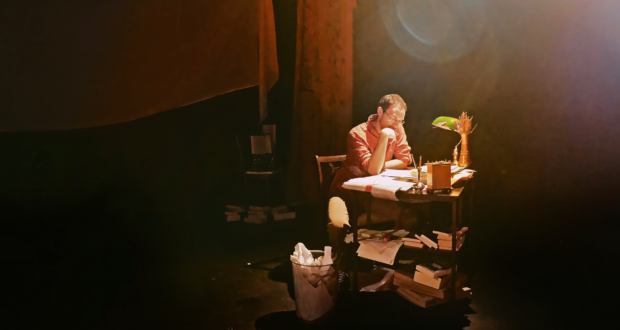A show that engages with powerful themes of queer representation in literature, but which overall feels confused and underwhelming.Summary
Rating
Ok
Clearly a lot of heart went into the concept of Tolstoy Tried to Kill My Girlfriend: the interrogation of the role of the author and doing justice to literary characters is an emotionally compelling topic. Author Deacon James (Joe Newton) is confronted by his own creation, queer artist Heath (Ezra Hawker Shaw), in a surreal realm of fictional characters and their authors. Heath protests against her author’s decision to kill off her girlfriend for the sake of literary tragedy, and the play grapples with the merits and drawbacks of this choice.
Spoiler: the play’s conclusion is that queer people deserve happy stories, and that literary representation can bring joy and hope to real people. I commend this narrative and certainly agree with the message. However the production itself falls short in a number of areas and therefore does a disservice to the characters and authors it features.
Throughout, I found it difficult to judge what tone the show was going for. Where Virginia Woolf (Sara Lynam) and Anna Karenina (Roxana Lupu) are making cogent arguments, Miss Havisham (also played by Lynam) verges on the pantomime dame. The queer interpretation of history is admirable, notably referencing Woolf’s ‘Orlando’ and Havisham’s disdain for heterosexual marriage (although this sat rather uncomfortably alongside the comedic delivery). Yet the presentation of neither Leo Tolstoy nor Anna Karenina does justice to the author or his works.
The play is too long for the story it is telling, and dialogue becomes repetitive. In terms of lighting, actors were repeatedly stepping into each other’s shadows. The audience was clearly confused as to whether the interval had started, and I felt the acting seldom landed in a middle ground between flat and melodramatic.
There was also some confusion between myself and my co-attendee as to the ending: my understanding was that the author had been in a coma and awoke to a visit from his lover, whereas the other interpretation was that he had died and left a positive legacy. It would certainly be a happy ending for him if he lived, although I question the ‘it was all a dream’ trope.
All this is not to say that the show is without merit: it is lovely to see a variety of queer characters coming from different time periods, and exploration of the value of queer stories. I enjoyed the latter half far more than the former, where the energy levels picked up considerably. Importantly, Ezra Harker-Shaw’s writing positively interrogates the assumptions of both readers and authors, particularly when it comes to LGBT+ figures and women.
The show certainly holds some powerful and promising dreams. However, my experience of it left me feeling that it could benefit from some edits and polishing. I would be keen to see how the play develops as it beds in to its run.
Written by: Ezra Harker-Shaw
Directed by: Heath MacPherson
Produced by: Paul Robinson for Pajorda Theatre Company
The show has completed its current run. CHeck the company’s website here for future dates and other shows.
 Everything Theatre Reviews, interviews and news for theatre lovers, London and beyond
Everything Theatre Reviews, interviews and news for theatre lovers, London and beyond



